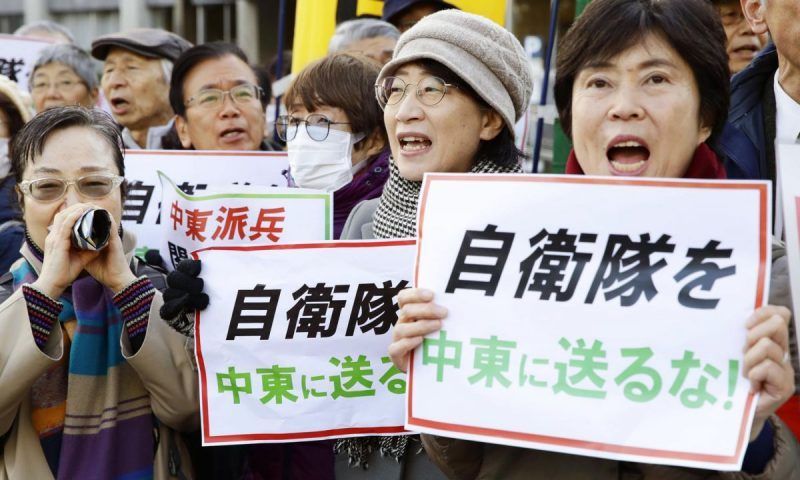
Since the end of the second world war and the enactment of its pacifist constitution, Japan has deployed its forces overseas mostly on peacekeeping operations under UN auspices – and almost never to places where its troops are in harm’s way. But next month, the country will send a naval destroyer to the Middle East. On what is being described as an intelligence-gathering mission, the warship will patrol the Gulf of Oman, the northern part of the Arabian sea and a portion of the Bab el-Mandeb strait, following a series of attacks on oil tankers in the region – including one that was Japanese-operated.
Last month’s decision by prime minister Shinzo Abe’s cabinet to send the destroyer is a curious one. Japan imports 90% of its oil from the Middle East and 80% passes through the strait of Hormuz, where ships are now being escorted by a US-led naval coalition. The Japanese warship will not patrol this crucial chokepoint, but it will still be in the vicinity – and if fighting breaks out, which looks more likely in the wake of the assassination of the Iranian general Qassem Suleimani, the mission could easily morph into armed support of the coalition.
This possibility of mission creep is precisely what the Japanese public worries about: a poll taken last month suggests 52% oppose the deployment while just 34% are in favour. Abe will be crossing his fingers that he is not forced to fight, as he is anxious not to stoke opposition to his plans to revise the country’s pacifist constitution in 2020. Japanese casualties would almost certainly nix any chances of revision, reinforcing public unease that at Washington’s behest Japan could be dragged into a conflict under the terms of the US-Japan defence guidelines enacted in 2015. These guidelines significantly expand what Japan is committed to do militarily in support of the US.
Abe is walking a tightrope. He has bowed to US pressure not to leave all the heavy lifting on security to Uncle Sam. But he is also wary of antagonising Iran, which has been blamed by Washington for the attacks on oil tankers. Japan has longstanding good ties with Tehran – a week before the naval deployment was announced, Abe hosted Hassan Rouhani, the Iranian president – and is keen to convince Iran to maintain its commitment to renounce nuclear weapons despite Donald Trump pulling the plug on the deal. Tokyo defers to Washington on security matters, but believes the deal is the best option and quietly disagrees with Trump’s decision, as do almost all US allies and strategic partners.
Trump is less popular in Japan than any US president before him. His unseemly bullying and crass behaviour go down badly. His erratic diplomacy and demands that Japan pay more for hosting US bases have only reinforced the government’s belief that in order to keep the US engaged militarily in the region, Japan has to step up. Big ticket purchases of military hardware from US manufacturers and a trade deal that will boost US agricultural exports to Japan are key elements of Abe’s damage-control strategy, but against the backdrop of a $60bn US trade deficit, probably only the start.
Japan’s minimalist deployment in the Middle East is less than the US wants, but it mollifies Iran and, perhaps more importantly, the Japanese public. Many in Japan are already concerned about Abe’s efforts to revise the constitution’s war-renouncing article 9, which imposes curbs on its military forces, so the country can take on a more assertive security role.
For most of its 65-year history, Abe’s conservative Liberal Democratic party consistently maintained that Japan could only use its military to defend itself. But in 2015, he passed unpopular legislation allowing the country to exercise the right of collective self-defence. This means Japan can now fight in support of the US and other strategic partners, dispatching troops into conflict zones overseas if the prime minister deems this essential, although it hasn’t yet done so. Aside from easing US frustrations about a one-sided security alliance, Abe and his supporters see article 9 as a symbol of Japan’s subordination to the US and seek revision as a matter of both national pride and national security.
Abe and others on the right worry that Washington is fed up with Japan not doing more on security at a time when the neighbourhood is getting more dangerous, with threats including China’s hegemonic ambitions and North Korea’s nuclear weapons programme. The Japanese public, in turn, worries where the hawkish Abe will lead them and even most supporters of revising the constitution oppose it on his watch. Facing such resistance, he has incrementally whittled down his proposal for revision of article 9 to merely declaring the self defence forces constitutional, an uncontroversial proposition.
Abe is taking a big political risk, which has grown considerably with Suleimani’s assassination. His government has been criticised for basing this deployment on an obscure, vaguely worded law permitting “investigation and research”, which grants the defence minister sweeping discretionary powers not subject to parliamentary oversight. Even though Japan has asserted that there is no imminent danger, it says it is prepared for military action if the situation escalates. But if anything goes wrong, don’t expect a burst of patriotism – there is a far higher chance of a strong domestic backlash. Given that revising the constitution is Abe’s holy grail, the stakes are very high indeed.
Jeff Kingston is director of Asian studies at Temple University Japan.
